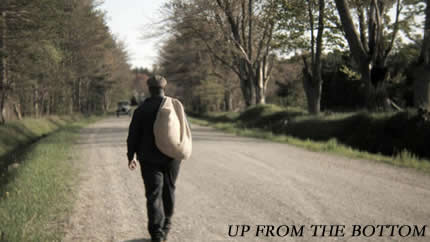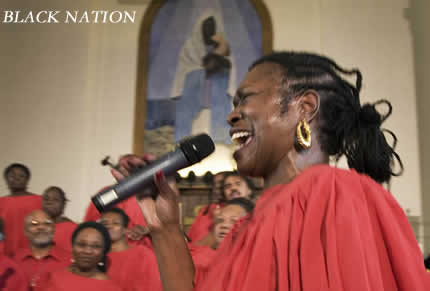 From February 19–24, BAMcinématek, in collaboration with the African Diaspora Film Festival, presents The Best of the African Diaspora Film Festival. This six-day series showcases eighteen films that enjoyed popular acclaim during the seventeenth annual African Diaspora Film Festival (ADFF). With a variety of dramatic and documentary films from around the globe, the series spotlights the diversity of filmmaking in Africa and throughout the African Diaspora.
From February 19–24, BAMcinématek, in collaboration with the African Diaspora Film Festival, presents The Best of the African Diaspora Film Festival. This six-day series showcases eighteen films that enjoyed popular acclaim during the seventeenth annual African Diaspora Film Festival (ADFF). With a variety of dramatic and documentary films from around the globe, the series spotlights the diversity of filmmaking in Africa and throughout the African Diaspora.
This year’s The Best of the African Diaspora Film Festival brings together films from countries including Nigeria, Jamaica, South Africa, Bolivia, Cuba, Senegal, Martinique, Egypt, and the U.S. Of the dramatic features, highlights include ADFF 2009’s opening night film Nothing but the Truth, directed by and starring acclaimed actor and playwright John Kani (The Island, Siswe Banzi Is Dead). Based on Kani’s own play about apartheid South Africa, the film was honored with the Silver Stallion award at FESPACO, the largest film festival in Africa. Other fiction films include Arugba (2008), a provocative allegory by Nigerian director Tunde Kelani; Dominique Cabrera’s French thriller When the City Bites (2009), starring Bamako‘s Aïssa Maïga; The Journey of the Lion (Fritz Baumann, 1992), about a Jamaican Rastafarian who travels across three continents in search of his roots (a Critic’s Choice in The New York Times); and Stolen Kisses (2009) by Egyptian filmmaker Khaled El Hagar, a subversive domestic drama set in modern Cairo.
Documentaries in this year’s lineup include Up from the Bottoms: The Search for the American Dream (James Schaub, 2009) and Blues March – Soldier Jon Hendricks (Malte Rauch, 2009). The  former investigates migration of African Americans from the Southern U.S. to the North during and after World War II, while the latter is a portrait of legendary jazz vocalist Hendricks (of Lambert, Hendricks and Ross) who fought in Europe in WWII, battling racial discrimination in the process. Additional highlights include the pair of films in the African Leaders program—Amilcar Cabral (Ana Ramos Lisboa, 2001), chronicling the revolutionary’s life and the uprising in Guinea-Bissau, and Frantz Fanon: His Life, His Struggle, His Work (Chiekh Djemai, 2001), a portrait of the Martinique-born philosopher and leader of the anti-colonial movement in Africa which details his involvement in the Algerian revolution. The Cultures of Resistance program presents two Latin American films: With A Stroke of the Chaveta (Pam Sporn, 2007), about the tradition of lectores, or readers, who work in cigar factories in Cuba, and Solidarity in Saya: An Afro-Bolivian Music Movement (Maya Jensen, 2009), about Afro-Bolivian rural villagers in La Paz.
former investigates migration of African Americans from the Southern U.S. to the North during and after World War II, while the latter is a portrait of legendary jazz vocalist Hendricks (of Lambert, Hendricks and Ross) who fought in Europe in WWII, battling racial discrimination in the process. Additional highlights include the pair of films in the African Leaders program—Amilcar Cabral (Ana Ramos Lisboa, 2001), chronicling the revolutionary’s life and the uprising in Guinea-Bissau, and Frantz Fanon: His Life, His Struggle, His Work (Chiekh Djemai, 2001), a portrait of the Martinique-born philosopher and leader of the anti-colonial movement in Africa which details his involvement in the Algerian revolution. The Cultures of Resistance program presents two Latin American films: With A Stroke of the Chaveta (Pam Sporn, 2007), about the tradition of lectores, or readers, who work in cigar factories in Cuba, and Solidarity in Saya: An Afro-Bolivian Music Movement (Maya Jensen, 2009), about Afro-Bolivian rural villagers in La Paz.
Two music documentaries examine the intersection of art and politics. In Made in Jamaica (Jerome Laperrousaz, 2006) interviews and musical performances with reggae and dancehall artists such as Gregory Isaacs, Bounty Killer, Toots & the Maytals, Vybz Kartel, Sly & Robbie, Elephant Man, Bunny Wailer, Lady Saw, and more are used to examine issues such as ghetto violence, slavery, and colonialism. Youssou N’dour: Return to Gorée (Pierre-Yves Borgeaud, 2006) explores the connections between African music and jazz and culminates with a performance by the Senegalese singer on the island of Gorée, from which many Africans were deported to the Americas as slaves. Work by New York-based filmmakers includes Anomaly (2009) by Jessica Chen Drammeh (part of the Identity Stories program), which investigates multiracial identity in the U.S. from various perspectives, and Pro-Black Sheep (2009) by Clayton Broomes Jr, a narrative film about the progress of black leadership in the U.S. There will be Q&As; with filmmakers at select screenings.
For more information on the films and schedule, please visit www.bam.org/view.aspx?pid=1878

